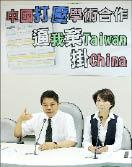Lawmakers across party lines yesterday criticized a Chinese academic for “politically bullying” a professor from National Tsing Hua University over an issue regarding Taiwan’s name.
Chinese Nationalist Party (KMT) caucus whip Chao Li-yun (趙麗雲) said the party condemned Peking University neurobiologist Rao Yi (饒毅) for insisting that Chiang Ann-shyn (江安世), director of Tsing Hua’s Brain Research Center, identify the university as being located in “Taiwan, China” in a research paper co-authored by the two.
Democratic Progressive Party Legislator Chen Ting-fei (陳亭妃) said Taiwanese scientists participating in international research are often put under pressure by their Chinese counterparts regarding Taiwan’s name.

Photo: Lo Pei-der, Taipei Times
According to Chen, it is common that when joint Taiwan-China research papers are published, Taiwan is labeled either as “part of China” or “Taiwan, China.”
She lashed out at President Ma Ying-jeou’s (馬英九) administration for its inaction over the matter, accusing it of “submitting to humiliation.”
One of Chiang’s students aided Rao’s team in conducting biomolecular research and Rao drafted a paper that included Chiang and the student as co-authors, but National Tsing Hua University was listed as being located in “Taiwan, China,” according to ScienceInsider, a Web site which specializes in news related to scientific policy.
A ScienceInsider article said Chiang told Rao that the National Science Council only allows institutions and researchers it funds to list their address as Taiwan or “Taiwan, ROC.” Chiang told Rao not to use the “Taiwan, China” name again or he would demand the removal of the Tsing Hua authors’ names from the research paper.
However, Rao wrote to National Science Council Minister Lee Lou-chuang (李羅權) earlier this week, without consulting Chiang, to say that his group was willing to drop People’s Republic of China from its address and to use “Beijing, China.”
He suggested the council should change its policy and instruct Chiang’s team to use “Taiwan, China,” saying that if the council does not make the change, it will make it “extremely difficult for Chinese scientists to co-author papers without explicitly or implicitly endorsing a Taiwan that is not a part of China.”
Lee confirmed on Monday he had received Rao’s letter, but said he ignored it.
National Science Council Deputy Minister Chen Cheng-hong (陳正宏) described Rao’s actions as “political bullying,” saying it is international practice for Taiwanese researchers use “Taiwan,” “Taiwan, ROC,” or “Taipei, Taiwan,” in papers published in international peer-reviewed journals.

‘DENIAL DEFENSE’: The US would increase its military presence with uncrewed ships, and submarines, while boosting defense in the Indo-Pacific, a Pete Hegseth memo said The US is reorienting its military strategy to focus primarily on deterring a potential Chinese invasion of Taiwan, a memo signed by US Secretary of Defense Pete Hegseth showed. The memo also called on Taiwan to increase its defense spending. The document, known as the “Interim National Defense Strategic Guidance,” was distributed this month and detailed the national defense plans of US President Donald Trump’s administration, an article in the Washington Post said on Saturday. It outlines how the US can prepare for a potential war with China and defend itself from threats in the “near abroad,” including Greenland and the Panama

A magnitude 4.9 earthquake struck off Tainan at 11:47am today, the Central Weather Administration (CWA) said. The hypocenter was 32.3km northeast of Tainan City Hall at a depth of 7.3km, CWA data showed. The intensity of the quake, which gauges the actual effect of a seismic event, measured 4 in Tainan and Chiayi County on Taiwan's seven-tier intensity scale, the data showed. The quake had an intensity of 3 in Chiayi City and County, and Yunlin County, while it was measured as 2 in Kaohsiung, Nantou County, Changhua County, Taitung County and offshore Penghu County, the data showed. There were no immediate reports of

The Chinese Nationalist Party (KMT) is maintaining close ties with Beijing, the Democratic Progressive Party (DPP) said yesterday, hours after a new round of Chinese military drills in the Taiwan Strait began. Political parties in a democracy have a responsibility to be loyal to the nation and defend its sovereignty, DPP spokesman Justin Wu (吳崢) told a news conference in Taipei. His comments came hours after Beijing announced via Chinese state media that the Chinese People’s Liberation Army’s Eastern Theater Command was holding large-scale drills simulating a multi-pronged attack on Taiwan. Contrary to the KMT’s claims that it is staunchly anti-communist, KMT Deputy

RESPONSE: The government would investigate incidents of Taiwanese entertainers in China promoting CCP propaganda online in contravention of the law, the source said Taiwanese entertainers living in China who are found to have contravened cross-strait regulations or collaborated with the Chinese Communist Party (CCP) could be subject to fines, a source said on Sunday. Several Taiwanese entertainers have posted on the social media platform Sina Weibo saying that Taiwan “must be returned” to China, and sharing news articles from Chinese state media. In response, the Mainland Affairs Council (MAC) has asked the Ministry of Culture to investigate whether the entertainers had contravened any laws, and asked for them to be questioned upon their return to Taiwan, an official familiar with the matter said. To curb repeated